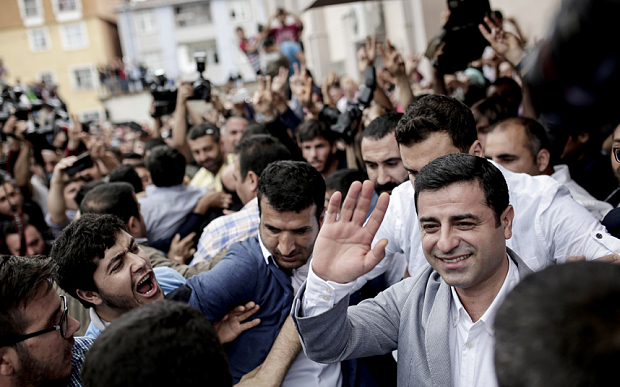With 99 per cent of votes counted, Recep Tayyip Erdogan’s party has lost its majority, as for the first time in the republic’s history a pro-Kurdish party is in parliament
Turkey witnessed dramatic changes in its political landscape on June 7 after the ruling Justice and Development Party (AKP) lost its parliamentary majority and the Peoples’ Democratic Party (HDP) crossed the notorious 10 percent threshold needed to enter parliament as a party.
Turkey’s governing AK party has lost its parliamentary majority for the first time in 13 years, near-complete election results show.
The surprise outcome also sees the pro-Kurdish HDP crossing the 10% threshold, securing seats for the first time.
With 99% of the vote counted, the AKP has 41% of the vote, state-run TRT television reports.
The result is a blow to President Recep Tayyip Erdogan’s plans to boost his office’s powers.
President Erdogan, who first came to power as prime minister in 2003, had been seeking a two-thirds majority to turn Turkey into a presidential republic.
The Turkish president Recep Tayyip Erdogan’s dreams of more power lay in tatters on Sunday as the country’s ruling party was handed its worst result in more than a decade.
The Justice and Development Party (AKP) had been in a tight race to keep its hold of the country’s National Assembly, – a far cry from its stated aims of winning a sweeping victory, then changing the country’s constitution.

AKP could still find itself forced into a coalition, although a senior party official told Reuters it expected a minority government and an early election.
To win a majority, the party needed at least 276 seats in the 550-seat assembly – but with 99 per cent of the votes counted, the AKP had won 258 seats, or a little over 41 per cent of the vote.
Sunday’s election has produced an extraordinary result and represents a major change in Turkish politics, the BBC’s Mark Lowen says.
The party that once seemed unstoppable for 13 years under Mr Erdogan may now struggle to form a government.
The AKP looks likely to win 258 seats in parliament, 18 fewer than it requires for a majority, forcing it to form a minority government or enter into a coalition.
Our correspondent says that there is now a subdued and glum atmosphere at the Justice and Development Party (AKP) headquarters in contrast to a sense of jubilation among HDP supporters at news that their party had won around 13% of the vote and would enter parliament for the first time.
“This was a victory of democracy over political corruption… of peace over war,” HDP deputy Sirri Sureyya Onder said.

The pro-Kurdish party, People’s Democratic Party (HDP) won 78 seats, and will enter parliament for the first time.
This would mean it will become the country’s first pro-Kurdish party in the Turkish parliament, with 11.7 per cent of the vote. Since 2013, there has been a ceasefire between Turkey’s government and the Kurdish insurgency, PKK (Kurdistan Workers’ Party).
More than 40,000 people were killed during the insurgency between 1984 and 2013 but since then Kurdish rights have begun to be accepted.
Selahattin Demirtas, co-chairman with Figen Yuksekdag, said the victory was one for all minorities, women, workers and the oppressed.
“It is a joint victory of the Left,” he said.
The election was a momentous day for minorities in Turkey as three Armenian candidates, AKP’s Makar Esayan, HDP’s Garo Paylan and the Republican People’s Party’s (CHP) Selima Dogan were expected to enter parliament. They will be the country’s only Armenian parliamentarians.
AKP in 2011 received more than 49 per cent of the vote, its highest result. But if the initial results are backed by final tallies, this will make it the first time its domination of the Turkish political scene is no longer guaranteed.
The Turkish prime minister thanked his supporters in his hometown of Konya, central Turkey.
“The nation’s decision is the best decision. Do not worry. We will never bow down to any power,” Ahmet Davutoglu said.




